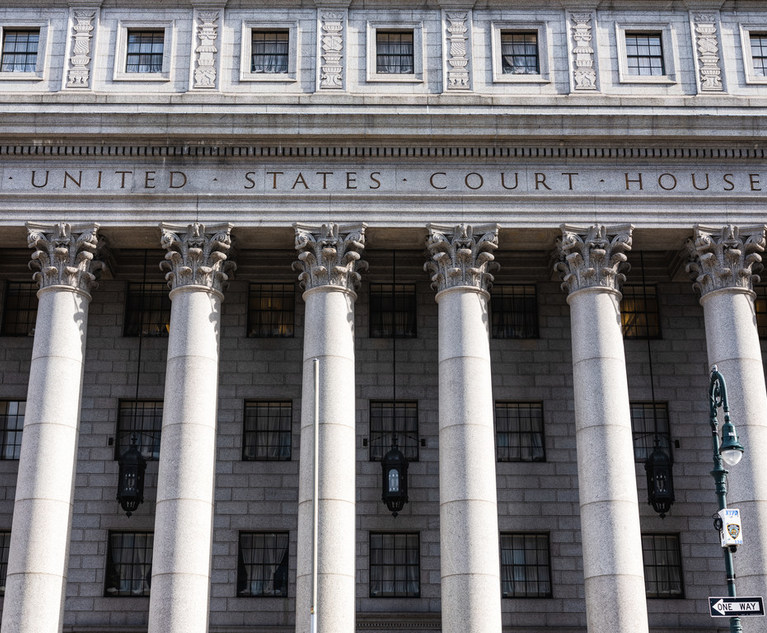Litigants in Second Circuit May Soon Be Entitled To Automatically Stay Arbitration Pending Appeal
In the event a court denies such a motion and the denial is appealed, a simple, yet surprisingly unresolved procedural question arises: Is the case automatically stayed pending appeal? This term, in 'Coinbase v Bielski', the U.S. Supreme Court will decide that issue for cases governed by the Federal Arbitration Act.
April 13, 2023 at 09:15 AM
9 minute read
Arbitration provisions are ubiquitous in commercial contracts. Notwithstanding the existence of arbitration clauses, lawsuits are often filed in court, forcing the other side to file a motion to compel arbitration. In the event a court denies such a motion and the denial is appealed, a simple, yet surprisingly unresolved procedural question arises: Is the case automatically stayed pending appeal? This term, in Coinbase v Bielski, the U.S. Supreme Court will decide that issue for cases governed by the Federal Arbitration Act (FAA).
FAA Background
In 1988, Congress amended the FAA by adding Section 16(a), which provides that an "appeal may be taken from" orders refusing arbitration—including orders "denying a petition" to require arbitration under Section 4 of the FAA, orders denying an application "to compel arbitration" under Section 206 of the FAA, and orders "refusing a stay of any action" under Section 3 of the FAA. 9 U.S.C. Section 16(a). Any litigant who moves to require arbitration "is entitled to an immediate appeal from denial of that motion." Arthur Andersen v. Carlisle, 556 U.S. 624, 627 (2009).
This content has been archived. It is available through our partners, LexisNexis® and Bloomberg Law.
To view this content, please continue to their sites.
Not a Lexis Subscriber?
Subscribe Now
Not a Bloomberg Law Subscriber?
Subscribe Now
NOT FOR REPRINT
© 2025 ALM Global, LLC, All Rights Reserved. Request academic re-use from www.copyright.com. All other uses, submit a request to [email protected]. For more information visit Asset & Logo Licensing.
You Might Like
View All
Drake Sues UMG for Defamation Over Promotion of False Claims of Pedophilia

Oil Co. Alleges Plot to Drive Away Competition in NYC's Liquid Fuel Market
3 minute read

NASDAQ Beats Back Investor Claims of Bias Against Minority-Owned Businesses
3 minute readLaw Firms Mentioned
Trending Stories
- 1Can a Law Firm Institutionalize Its Culture? Boies Schiller’s New Chairman Will Try
- 2Full 8th Circuit Hears First Amendment Challenge to School District’s ‘Equity Training’
- 3Exploring Generative AI’s Impact on Intellectual Property
- 4Training Lawyers in AI and Using AI to Boost Training
- 5EB-5 Rebounds After a Rocky Year: Challenges of 2024 Lay Groundwork for a Booming 2025
Who Got The Work
J. Brugh Lower of Gibbons has entered an appearance for industrial equipment supplier Devco Corporation in a pending trademark infringement lawsuit. The suit, accusing the defendant of selling knock-off Graco products, was filed Dec. 18 in New Jersey District Court by Rivkin Radler on behalf of Graco Inc. and Graco Minnesota. The case, assigned to U.S. District Judge Zahid N. Quraishi, is 3:24-cv-11294, Graco Inc. et al v. Devco Corporation.
Who Got The Work
Rebecca Maller-Stein and Kent A. Yalowitz of Arnold & Porter Kaye Scholer have entered their appearances for Hanaco Venture Capital and its executives, Lior Prosor and David Frankel, in a pending securities lawsuit. The action, filed on Dec. 24 in New York Southern District Court by Zell, Aron & Co. on behalf of Goldeneye Advisors, accuses the defendants of negligently and fraudulently managing the plaintiff's $1 million investment. The case, assigned to U.S. District Judge Vernon S. Broderick, is 1:24-cv-09918, Goldeneye Advisors, LLC v. Hanaco Venture Capital, Ltd. et al.
Who Got The Work
Attorneys from A&O Shearman has stepped in as defense counsel for Toronto-Dominion Bank and other defendants in a pending securities class action. The suit, filed Dec. 11 in New York Southern District Court by Bleichmar Fonti & Auld, accuses the defendants of concealing the bank's 'pervasive' deficiencies in regards to its compliance with the Bank Secrecy Act and the quality of its anti-money laundering controls. The case, assigned to U.S. District Judge Arun Subramanian, is 1:24-cv-09445, Gonzalez v. The Toronto-Dominion Bank et al.
Who Got The Work
Crown Castle International, a Pennsylvania company providing shared communications infrastructure, has turned to Luke D. Wolf of Gordon Rees Scully Mansukhani to fend off a pending breach-of-contract lawsuit. The court action, filed Nov. 25 in Michigan Eastern District Court by Hooper Hathaway PC on behalf of The Town Residences LLC, accuses Crown Castle of failing to transfer approximately $30,000 in utility payments from T-Mobile in breach of a roof-top lease and assignment agreement. The case, assigned to U.S. District Judge Susan K. Declercq, is 2:24-cv-13131, The Town Residences LLC v. T-Mobile US, Inc. et al.
Who Got The Work
Wilfred P. Coronato and Daniel M. Schwartz of McCarter & English have stepped in as defense counsel to Electrolux Home Products Inc. in a pending product liability lawsuit. The court action, filed Nov. 26 in New York Eastern District Court by Poulos Lopiccolo PC and Nagel Rice LLP on behalf of David Stern, alleges that the defendant's refrigerators’ drawers and shelving repeatedly break and fall apart within months after purchase. The case, assigned to U.S. District Judge Joan M. Azrack, is 2:24-cv-08204, Stern v. Electrolux Home Products, Inc.
Featured Firms
Law Offices of Gary Martin Hays & Associates, P.C.
(470) 294-1674
Law Offices of Mark E. Salomone
(857) 444-6468
Smith & Hassler
(713) 739-1250







